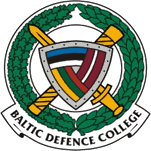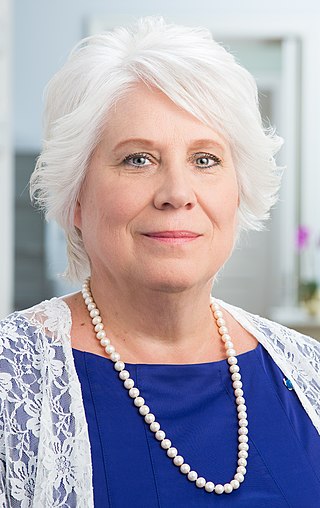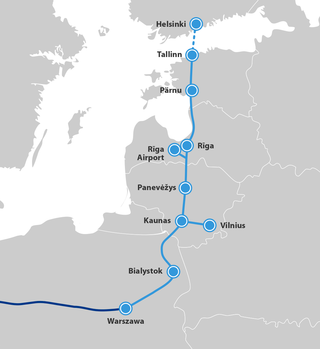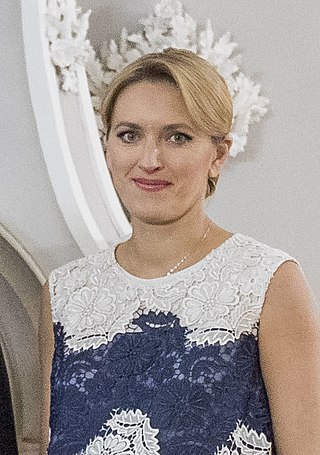
Latvia, officially the Republic of Latvia, is a country in the Baltic region of Northern Europe. It is one of the three Baltic states, along with Estonia to the north and Lithuania to the south. It borders Russia to the east and Belarus to the southeast, and shares a maritime border with Sweden to the west. Latvia covers an area of 64,589 km2 (24,938 sq mi), with a population of 1.9 million. The country has a temperate seasonal climate. Its capital and largest city is Riga. Latvians, who are the titular nation and comprise 63.0% of the country's population, belong to the ethnolinguistic group of the Balts and speak Latvian. Russians are the most prominent minority in the country, at almost a quarter of the population; 37.7% of the population speak Russian as their native tongue.

The Baltic states or the Baltic countries is a geopolitical term encompassing Estonia, Latvia, and Lithuania. All three countries are members of NATO, the European Union, the Eurozone, Council of Europe, and the OECD. The three sovereign states on the eastern coast of the Baltic Sea are sometimes referred to as the "Baltic nations", less often and in historical circumstances also as the "Baltic republics", the "Baltic lands", or simply the Baltics. The term Balticum is sometimes used to describe the region comprising the three states.

The Baltic Defence College (BALTDEFCOL) is a multinational military college, established by the three Baltic states in 1999. It serves as a centre of strategic and operational research and provides professional military education to intermediate- and senior-level officers and government officials from the founding states, other member states of the European Union (EU) and the North Atlantic Treaty Organization (NATO) countries, as well as other European countries including Armenia, Azerbaijan, Bosnia and Herzegovina, Georgia, Moldova, Montenegro, Serbia and Ukraine.
Bruce Pitcairn Jackson is the founder and president of the Project on Transitional Democracies. The project is a multi-year endeavor aimed at accelerating the pace of reform in post-1989 democracies and advancing the date for the integration of these democracies into the institutions of the Euro-Atlantic.

The Baltic Entente was based on Treaty of Good-Understanding and Co-operation signed between Lithuania, Latvia, and Estonia on 12 September 1934 in Geneva. The main objective of the agreement was joint action in foreign policy. It also included commitments to support one another politically and to give diplomatic support in international communication. The endeavour was ultimately unsuccessful, as the combined strength of the three nations and their statements of neutrality were insubstantial in the face of the massive armies of Poland, Germany and the Soviet Union.

The Baltic air-policing mission is a NATO air defence Quick Reaction Alert (QRA) in order to guard the airspace above the three Baltic countries of Estonia, Latvia and Lithuania.

The State Partnership Program (SPP) is a joint program of the United States Department of Defense (DoD) and the individual states, territories, and District of Columbia. The program and the concept originated in 1993 as a simplified form of the previously established (1992) Joint Contact Team Program (JCTP). The JCTP aimed at assisting former Warsaw Pact and Soviet Union Republics, now independent, to form democracies and defense forces of their own. It featured long-term presence of extensive and expensive teams of advisory specialists. The SPP shortened the advisory presence to a United States National Guard unit of a designated state, called a partner, which would conduct joint exercises with the host. It is cheaper, has a lesser American presence, and can comprise contacts with civilian agencies. Today both programs are funded.

The three Baltic countries, or the Baltic states – Estonia, Latvia, and Lithuania – are held to have continued as independent states under international law while under Soviet occupation from 1940 to 1991, as well as during the German occupation in 1941–1944/1945. The prevailing opinion accepts the Baltic thesis that the Soviet occupation was illegal, and all actions of the Soviet Union related to the occupation are regarded as contrary to international law in general and to the bilateral treaties between the USSR and the three Baltic countries in particular.

Marina Kaljurand is an Estonian politician and Member of the European Parliament. Kaljurand served as Minister of Foreign Affairs in Taavi Rõivas' second cabinet as an independent. Earlier, she served as the Ambassador of Estonia to the United States, Russia, Mexico, Canada, Kazakhstan, and Israel.

Rail Baltica is an under-construction rail infrastructure project that is intended to integrate the Baltic states in the European rail network. Its purpose is to provide passenger and freight service between participating countries and improve rail connections between Central and Northern Europe, specifically the area southeast of the Baltic Sea. It is also intended as a catalyst for building the economic corridor in Northeastern Europe. The project envisages a continuous rail link from Tallinn (Estonia) to Warsaw (Poland), consisting of links via Riga (Latvia), Kaunas, and Vilnius (Lithuania). Its total length in the Baltic States is 870 kilometres (540 mi), with 213 kilometres (132 mi) in Estonia, 265 kilometres (165 mi) in Latvia, and 392 kilometres (244 mi) in Lithuania. Rail Baltica is one of the priority projects of the European Union (EU). It is part of the North Sea–Baltic Corridor of the Trans-European Transport Networks (TEN-T).

BALTOPS is an annual military exercise, held and sponsored by the Commander, United States Naval Forces Europe, since 1971, in the Baltic Sea and the regions surrounding it.

Latvia–Lithuania relations are bilateral international relations between Latvia and Lithuania. Latvia has an embassy in Vilnius, and Lithuania has an embassy in Riga. The two states share 588 kilometres (365 mi) of common border. Both countries are full members of the NATO and European Union.
Russian influence operationsin Estonia consist of the alleged actions taken by the government of the Russian Federation to produce a favorable political and social climate in the Republic of Estonia. According to the Estonian Internal Security Service, Russian influence operations in Estonia form a complex system of financial, political, economic and espionage activities in Republic of Estonia for the purposes of influencing Estonia's political and economic decisions in ways considered favourable to the Russian Federation and conducted under the doctrine of near abroad. Conversely, the ethnic Russians in Estonia generally take a more sympathetic view of Moscow than that of the Estonian government. According to some, such as Professor Mark A. Cichock of the University of Texas at Arlington, the Russian government has actively pursued the imposition of a dependent relationship upon the Baltic states, with the desire to remain the region's dominant actor and political arbiter, continuing the Soviet pattern of hegemonic relations with these small neighbouring states. According to the Centre for Geopolitical Studies, the Russian information campaign which the centre characterises as a "real mud throwing" exercise, has provoked a split in Estonian society amongst Russian speakers, inciting some to riot over the relocation of the Bronze Soldier. The 2007 cyberattacks on Estonia is considered to be an information operation against Estonia, with the intent to influence the decisions and actions of the Estonian government. While Russia denies any direct involvement in the attacks, hostile rhetoric from the political elite via the media influenced people to attack.

The guerrilla war in the Baltic states was an insurgency waged by Baltic partisans against the Soviet Union from 1944 to 1956. Known alternatively as the "Forest Brothers", the "Brothers of the Wood" and the "Forest Friars", these partisans fought against invading Soviet forces during their occupation of the Baltic states during and after World War II. Similar insurgent groups resisted Soviet occupations in Bulgaria, Poland, Romania and Ukraine.
The Diplomatic Service of the Republic of Lithuania is the part of the governmental service tasked with enforcing the foreign policy set by the President, the Parliament, and the Government of the Republic of Lithuania. The head of the service is the Foreign Minister.

Saber Strike is an annual international exercise held since 2010 by the United States Army Europe (USAREUR) focused on the Baltic States. The exercise spans multiple locations in Lithuania, Latvia and Estonia and involves approximately 2,000 troops from 14 countries.

Ieva Ilvesa is a Latvian diplomat, politician and cyber security policy expert, and former First Lady of Estonia. Ilvesa ran as a Latvian candidate for the 2019 European Parliament election. She was the third place candidate for Development/For!, second on the list was Baiba Rubesa, the former CEO of Rail Baltica.

The House Baltic Caucus is a bipartisan registered Caucus of the House of Representatives since its inception in 1997 and is composed of members from both the Democratic and Republican Parties. The members of the House Baltic Caucus have a strong interest in promoting opportunities to strengthen the economic, political, and cultural relationships of the United States with Estonia, Latvia, and Lithuania.















